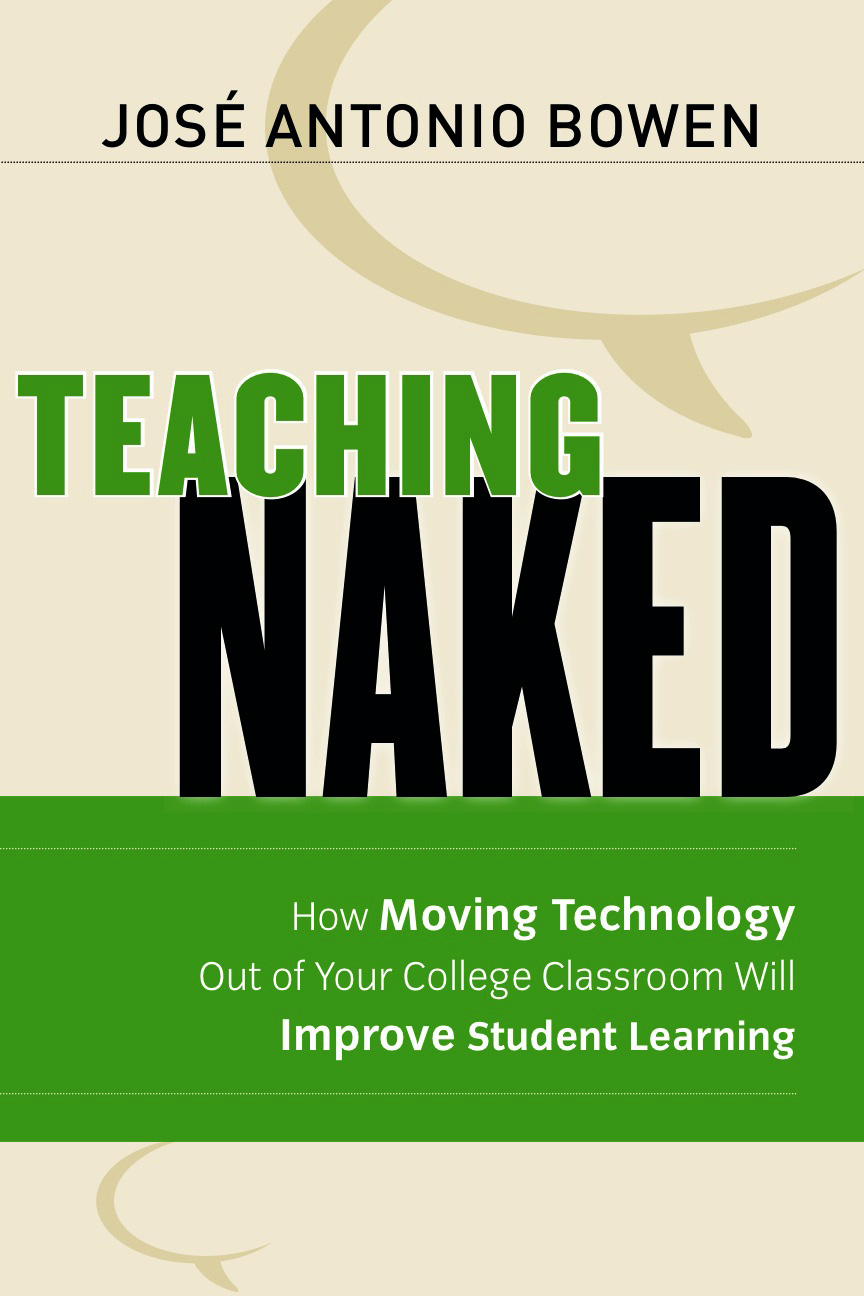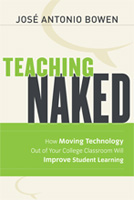Meadows Dean José Antonio Bowen Releases Most Recent Book, Teaching Naked: How Moving Technology Out of Your Classroom Will Improve Student Learning
Teaching Naked presents Bowen’s innovative active-learning strategy to enhance the higher-education classroom experience

 |
|
SMU Meadows Dean José Antonio Bowen’s most recent book is now available.
|
Today, Jossey-Bass, an imprint of Wiley, published José Antonio Bowen’s most recent book Teaching Naked: How Moving Technology Out of Your College Classroom Will Improve Student Learning. As the Dean of SMU’s Meadows School of the Arts since 2006 and with 30 years of teaching experience at one English and four American universities, Bowen has experienced first-hand the revolutionary impact of technology on higher education learning and has developed a methodology for using technology outside of the classroom to create a more challenging and meaningful in-class experience.
“Effective university professors need to teach naked,” explains Bowen. “It’s not what you think: If higher education is going to remain competitive in the future, we must strip technology from the college classroom and focus our energies on strengthening the unique value of a traditional liberal arts education: student-to-faculty interaction, small group discussions and engaged, interactive learning. Technology is great for content, but discussion is still the best way to challenge and open minds.”
Through Teaching Naked, Bowen shares practical advice and easy methods for faculty and administrators to engage students with mobile and web technology in a way that restructures traditional class meetings into active learning environments. Bowen encourages higher education faculty to replace PowerPoint lectures with podcasts, online assignments and low-stakes exams, to ensure that students interact with course material before scheduled classes and are prepared to participate in valuable interactive discussions during class. As universities face increased competition from online education, Teaching Naked provides an increasingly essential strategy to differentiate the classroom experience and provide additional value to justify the additional cost of physical classrooms.
“Everyone who is concerned about the future of higher education should read it [José Bowen’s Teaching Naked],” said Professor Ken Bain, author of What the Best College Teachers Do and Provost, University of the District of Columbia. “Bowen makes the most intelligent argument I've encountered about how we should think about teaching and learning and emerging technologies.”
Teaching Naked is now available in both print and e-book formats on Amazon.com, iTunes, and Wiley’s website.
Visit the official Teaching Naked website.
About José Antonio Bowen
José Antonio Bowen has been Dean of the Meadows School of the Arts, Algur H. Meadows Chair and Professor of Music at Southern Methodist University since 2006. His teaching career began at Stanford University in 1982, as the Director of Jazz Ensembles. In 1994, he became the Founding Director of the Centre for the History and Analysis of Recorded Music at the University of Southampton, England. He returned to America in 1999 as the first holder of the endowed Caestecker Chair of Music in the new Program in the Performing Arts at Georgetown University. He was then Dean of Fine Arts and Professor of Music at Miami University before moving to SMU in Dallas.
Bowen has written over 100 scholarly articles in many journals including the Journal of Musicology, The Journal of Musicological Research, Performance Practice Review, 19th-century Music, Notes, Music Theory Spectrum, the Journal of the Royal Musical Associations, Studi Musicali, the New Grove Dictionary of Music and Musicians and in books from Oxford and Princeton university presses. He is also the editor of the Cambridge Companion to Conducting (Cambridge University Press, 2003), and he received a National Endowment for the Humanities (NEH) Fellowship. He contributed to Discover Jazz (Pearson, 2011) and served as an editor (along with David Baker, Dan Morgenstern, John Hasse and Alyn Shipton) of the 6-CD set, Jazz: The Smithsonian Anthology (2011). His TED talk on Beethoven as Bill Gates is featured on the TED website.
Bowen has also been a pioneer in active learning and the use of technology in the classroom, including podcasts and online games. He has been featured in The Wall Street Journal, Newsweek, USA Today, US News and World Report, and on NPR for his concept, now encompassed by his book, Teaching Naked: How Moving Technology Out of Your College Classroom Will Improve Student Learning (Jossey-Bass, August 2012). He was nominated by both students and colleagues for teaching awards at Georgetown and Miami, and in 1990 he received a Stanford Centennial Award for Undergraduate Teaching.
In over 30 years as a jazz performer, he has appeared in Europe, Israel and the United States with Stan Getz, Dizzy Gillespie, Bobby McFerrin, Dave Brubeck, Liberace and many others. His compositions, conducting and playing are featured on numerous recordings and his latest CD, Uncrowded Night, features his playing with the José Bowen Quartet. He has written a symphony (which was nominated for the Pulitzer Prize in Music in 1985), a film score, and music for Hubert Laws, Jerry Garcia and many others. His Jewish music (published by Transcontinental Music) is also widely performed and includes a Jazz Shabbat Service, which has received over 80 performances around the world. Other awards for his compositions include the Hubbell, Popular and Standard Awards (from ASCAP), the Louis Sudler Prize in the Arts, the Bell T. Richie Prize and the Koret Israel Prize.
Bowen holds four degrees from Stanford University – a Bachelor of Science in chemistry, a Master of Arts in music composition, a Master of Arts in humanities and a joint Ph.D. in musicology and humanities – and is a Founding Board Member of the National Recording Preservation Board for the Library of Congress. In 1996, Bowen was elected as a Fellow of the Royal Society of Arts (FRSA) in England.